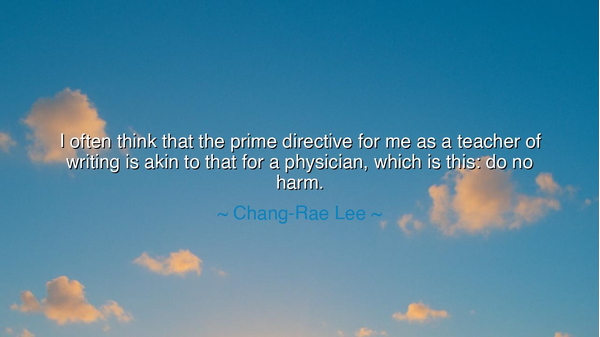
I often think that the prime directive for me as a teacher of
I often think that the prime directive for me as a teacher of writing is akin to that for a physician, which is this: do no harm.






The novelist and teacher Chang-Rae Lee once uttered words of profound humility and wisdom: “I often think that the prime directive for me as a teacher of writing is akin to that for a physician, which is this: do no harm.” In this reflection, he ties the vocation of teaching to the sacred calling of healing. Just as a doctor must guard against injuring the fragile body of the patient, so must the teacher guard against crushing the spirit of the learner. For in the tender act of writing, where words spring forth from the hidden chambers of the soul, even a careless critique can wound more deeply than a blade.
The prime directive Lee invokes is ancient: primum non nocere—first, do no harm. Physicians throughout the ages have carried this commandment as their first duty, knowing that even their well-meaning interventions might destroy life rather than preserve it. So too, the teacher of writing carries in his hands something delicate: the voice of a student, uncertain, untested, and vulnerable. To wound this voice is to silence a potential song forever. Thus Lee teaches that the first responsibility of the teacher is not to display authority, nor to impose rigid standards, but to ensure that the flame of creativity is not extinguished.
History offers us many examples of voices silenced too soon, and others protected until they flourished. Consider the poet Emily Dickinson, who wrote in seclusion, fearful that the harsh judgments of others might extinguish her peculiar style. Though unrecognized in her lifetime, her verse survived because it was not trampled upon by those closest to her. Contrast this with countless unknown writers who, receiving only scorn or disdain, abandoned their art forever. The difference often lies not in talent, but in the care of teachers and companions—whether they inflicted harm, or nurtured growth.
Lee’s wisdom also points to the delicate balance in teaching. To do no harm does not mean to withhold correction, just as a physician must sometimes cut in order to heal. But the spirit in which correction is given matters most. A teacher must cut with precision, not with cruelty; must prune so that the tree grows stronger, not slash so that it withers. The teacher’s art lies not only in knowledge of craft, but in compassion, in the discernment to know when to press and when to protect.
This teaching carries weight beyond the classroom. For in truth, we are all teachers—parents guiding children, friends advising friends, leaders shaping communities. In every role, our words carry power to heal or to wound. How often has a harsh word discouraged a young dreamer? How often has a gentle encouragement preserved a fragile hope? The lesson of doing no harm calls us to examine our tongues, to wield our influence with humility, and to remember that within every person burns a light that must not be snuffed out.
Therefore, let the seeker of wisdom take this path: speak truth, but speak it in love. Offer guidance, but never at the cost of another’s spirit. Correct, but with the aim of building, not destroying. In practical life, this means pausing before criticism, weighing whether it will strengthen or merely humiliate. It means seeking out what is good and naming it, even as we point out what can be improved. It means remembering always that the soul before us is not clay for our hands to shape as we wish, but a living being entrusted to our care.
So the words of Chang-Rae Lee endure as a noble reminder: the teacher, like the physician, must above all do no harm. And if we live by this law, whether in classrooms or in daily life, we will leave behind not scars, but gardens; not silence, but songs; not despair, but courage. For the highest teacher is not the one who displays his own brilliance, but the one who preserves and strengthens the light of others, until they too may shine.






AAdministratorAdministrator
Welcome, honored guests. Please leave a comment, we will respond soon